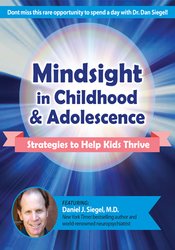

Are you struggling to effectively treat children and adolescents who may be experiencing behavior disorders, trauma, anxiety, and mood disorders?
Daniel J. Siegel, M.D, New York Times bestselling author and worldrenowned neuropsychiatrist, has developed the Mindsight approach, which provides a unique understanding of relationships, brain, and the developing mind. Built on decades of synthesis of a range of fields of research to help create the field of Interpersonal Neurobiology, his approach expertly illuminates the science of how the young mind is formed, and provides relational strategies that support brain integration to support healthy development and achieve optimal regulation and lasting change in the child’s or adolescent’s life.
Childhood and adolescence are important and distinct periods of brain development. When we understand the similarities and differences across these periods, we can better support the development of children and adolescents. You will take home practical skills for teaching youth how to use the mind to create integration within the body and brain, and within our relationships with people and nature.
Equipped with this knowledge and these skills, clinicians, educators, and parents are in a strong position to use science-inspired strategies to support the growth of well-being lives of children and adolescents to help them thrive!
If you work with children & adolescents, this is a course you do not want to miss!
| File type | File name | Number of pages | |
|---|---|---|---|
| Manual - Mindsight in Childhood & Adolescence (2.8 MB) | 51 Pages | Available after Purchase | |
| Manual - Mindsight in Childhood & Adolescence - French (2.8 MB) | 51 Pages | Available after Purchase | |
| Manual - Mindsight in Childhood & Adolescence - French (2.8 MB) | 51 Pages | Available after Purchase | |
| Manual - Mindsight in Childhood & Adolescence - Italian (2.8 MB) | 51 Pages | Available after Purchase | |
| Manual - Mindsight in Childhood & Adolescence - Italian (2.8 MB) | 51 Pages | Available after Purchase |

Daniel J. Siegel, MD, is a graduate of Harvard Medical School and completed his postgraduate medical education at UCLA with training in pediatrics and child, adolescent, and adult psychiatry. He is currently a clinical professor of psychiatry at the UCLA School of Medicine, founding co-director of UCLA's Mindful Awareness Research Center, founding co-investigator at the UCLA Center for Culture, Brain and Development, and executive director of the Mindsight Institute, an educational center devoted to promoting insight, compassion, and empathy in individuals, families, institutions, and communities.
Dr. Siegel's psychotherapy practice spans thirty years, and he has published extensively for the professional audience. He serves as the Founding Editor for the Norton Professional Series on Interpersonal Neurobiology which includes over 70 textbooks. Dr. Siegel's books include his five New York Times bestsellers: Aware: The Science and Practice of Presence; Brainstorm: The Power and Purpose of the Teenage Brain, Mind: A Journey to the Heart of Being Human, and two books with Tina Payne Bryson, Ph.D, The Whole-Brain Child and No-Drama Discipline. His other books include:The Power of Showing Up also with Tina Payne Bryson, Ph.D., The Developing Mind, The Pocket Guide to Interpersonal Neurobiology, Mindsight, The Mindful Brain, The Mindful Therapist, Parenting from the Inside Out (with Mary Hartzell, M.Ed.), and The Yes Brain (also with Tina Payne Bryson, Ph.D). He has been invited to lecture for the King of Thailand, Pope John Paul II, His Holiness the Dalai Lama, Google University, and TEDx.
Speaker Disclosures:
Financial: Dr. Daniel Siegel is the clinical professor at the UCLA School of Medicine, the medical director of Lifespan Learning Institute, the executive director of Center for Human Development and Mindsight Institute, and the founding editor of Norton Series on Interpersonal Neurobiology. He receives royalties as a published author. Dr. Daniel Siegel receives a speaking honorarium, recording royalties, and book royalties from PESI, Inc. He has no relevant financial relationships with ineligible organizations.
Non-financial: Dr. Daniel Siegel serves on the advisory board for Gloo and Convergence in Washington, D.C.
Mind, the Embodied Brain and Relationships: An Understanding for Clinical Application
The Developing Mind in Childhood and Adolescence: Strategies to Nurture and Heal the Developing Mind
Attachment, Resilience, and Childhood Development: Clinical Assessment and Treatment for Children
Working with the Remodeling of the Adolescent Brain: Brain Remodeling During a Time of Change
Please wait ...